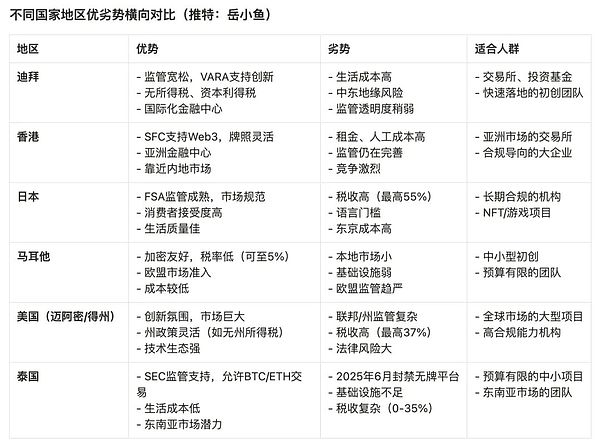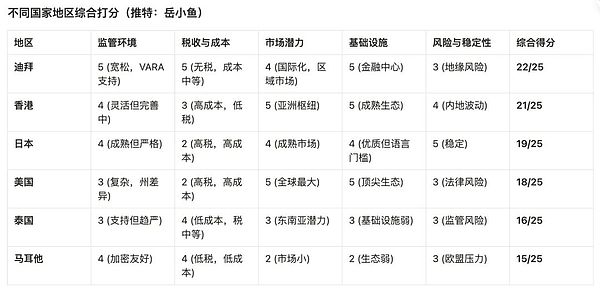Recently, there was an explosive piece of news in the crypto industry: Singapore has recently strengthened its regulation of the cryptocurrency industry.
Simply put, the core requirement of the new regulation is that from June 30, 2025, crypto service providers without a Digital Token Service Provider (DTSP) license will not be allowed to serve overseas customers.
The scope of this new regulation is very broad, covering token issuance, trading, custody, consulting, and even research report publication. With increased capital thresholds and upgraded KYC/AML requirements, this is forcing many small and medium-sized players and unlicensed entities to consider relocation.
Chinese people in the crypto industry are very much like "Jews", being forced to leave their homeland and constantly migrating.
First moving from the mainland to Hong Kong, then from Hong Kong to Singapore, and now departing from Singapore to find their next place of settlement.
Everyone is speculating where the crypto "Jews" will go next, and which place will be the Jerusalem of the crypto world. This article will systematically analyze this.
1. Impact Assessment: How Many People Will Be Affected by the New Regulation?
Let's first conduct an impact assessment.
Singapore has issued DTSP licenses to 33 companies, with some companies temporarily exempted from operating in Singapore before the PSA (Payment License) took effect on January 28, 2020, and required to operate compliantly before their license application is approved or rejected.
So how many companies have not yet obtained a license?
According to 2021 MAS data, MAS received 480 payment service license applications (including DPT/DTSP related), of which 19% (about 91) were withdrawn or rejected. By 2025, only 33 companies have obtained DTSP licenses, with an approval rate of less than 10%.
Based on this application data, it is currently estimated that there are 200-300 crypto-related entities, with unlicensed and non-exempt companies potentially accounting for 60%-80% (about 120-240).
Assuming each project team has 5 to 20 people, this means an estimated thousands of direct employees in the crypto industry, but indirectly affecting hundreds of thousands of users (market ecosystem).
For Singapore, a significant proportion of talent and capital in the crypto industry will be lost.
2. Where Will Crypto Industry Practitioners Go?
Where will such a high-density talent and capital flow? Where will be the next destination for crypto "Jews"?
There are various opinions. Here are several highly mentioned popular countries and regions for a horizontal comparison:

These countries and regions can be said to have their own advantages and disadvantages. Which country is more attractive?
Actually, we still need to start from demand and first understand what the crypto "Jews" want.
Generally speaking, as a profit-seeking and highly mobile group, crypto "Jews" will definitely prioritize regions with lenient regulation, tax incentives, and well-established infrastructure.
So, we can extract the core factors for a more quantitative assessment.
Here are 5 main evaluation dimensions:
- Regulatory Environment (high weight): Lenient and clear regulation facilitates quick implementation, while strict but mature regulation is suitable for long-term development.
- Taxation and Costs (high weight): Low tax rates and low living/operating costs are crucial for capital-sensitive crypto industries.
- Market Potential (medium weight): Local and regional market size, crypto adoption rate, and internationalization level.
- Infrastructure and Ecosystem (medium weight): Financial, technological, legal support, and international environment.
- Risks and Stability (medium weight): Geopolitical factors, regulatory uncertainty, and legal risks.
Each factor is scored on a1-5 scale (5 being the best), and after comprehensive scoring and ranking:

After scoring, we can draw the following conclusions:
(1) Dubai and Hong Kong are the top choices, suitable for quick low-tax landing and deep market penetration in Asia, respectively.
(2) Japan and the US are suitable for players with long-term compliance needs or global ambitions, but costs and complexity need to be weighed.
(3) Thailand and Malta are more suitable for small and medium projects with limited budgets, with Thailand requiring attention to SEC license requirements in the short term.
However, different projects still need to choose based on their own business scale, market targets, and financial strength:
For large players, Dubai, Hong Kong, and the US can be chosen.
For small and medium teams, Thailand, Malta (short-term), Hong Kong, and Japan (long-term) can be considered.
3. Summary
Will this migration of crypto "Jews" give birth to a new "crypto Jerusalem"? Which place will become the next cryptocurrency center?
Currently, regions like Dubai, Hong Kong, and Japan have initially formed a loose crypto economic circle, each with its own characteristics. Dubai offers low taxes, Hong Kong provides compliance, and Japan is mature. Through the blockchain world's connections, they are more like a crypto federation.
This migration may be a turning point from the wild growth to mature governance in the crypto industry.
We must understand that the true revolution is on the chain, not in geography. The destination of migration is not a specific city, but the continuation of belief, the pursuit and exploration of decentralization.
So, can we ultimately break free from geographical constraints?







